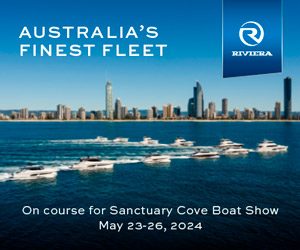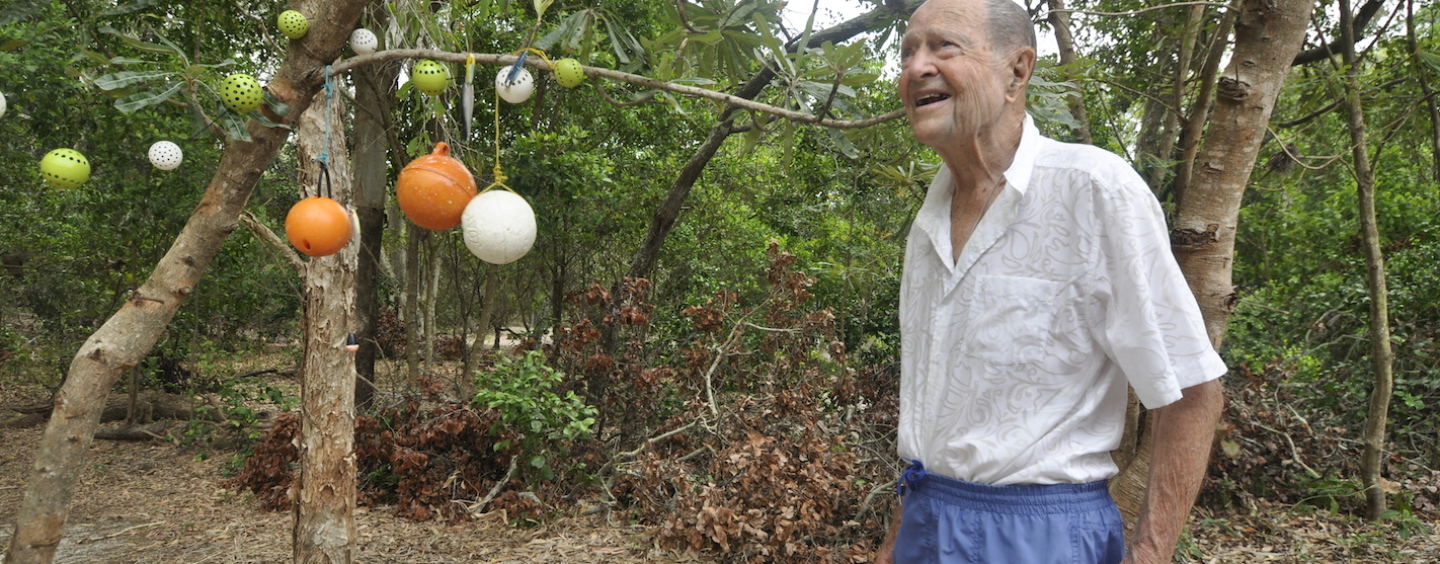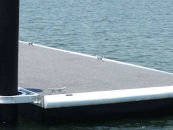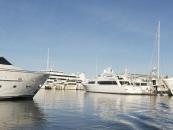Retired surgeon, Charles Roe, celebrates his 99th birthday on 14 February 2018. For him, it has been a life-long love affair with South Stradbroke’s idyllic beaches, bush and wildlife. Charles was first brought to South Stradbroke in 1920 as a baby in his mother’s arms, but his family’s connection to the island goes even further back.
In 1878, Charles’ grandfather, Reginald, brought his family and friends down from Brisbane on a steam ship to enjoy a quiet holiday on Stradbroke Island (before the island split into two). The joys of the island’s abundant fishing, sailing and surfing appealed so much that Regi and his friends purchased 10 acres in 1885. They built a holiday camp structure which was the beginnings of Roe’s Kamp, which neighbours the home Charles lives in today.
The camp was built on the very southern end of Stradbroke. It was not until a huge storm in 1897 that the water broke through at Jumpinpin to create the North and South Stradbroke Islands we know today. Unfortunately for Roe’s Kamp, mother nature was not finished. Another huge storm in 1938 washed away the entire southern end of South Stradbroke Island (South Straddie), forcing the camp to be relocated to its current spot, opposite Runaway Bay. The Gold Coast Council later took advantage of the washed away portion of South Straddie to create the Seaway we now enjoy.
The final environmental challenge the Roe family faced was the relentless movement of the sand dunes. Harsh ocean winds and a large population of cattle and horses created a perfect storm of loose sand that pushed the large dunes inland at an alarming rate. The dunes might create the perfect spot for a game of sand hockey one year, and then it would be buried the next year.
Thankfully, with a little help from a friend of Charles, the government created the Beach Protection Authority, which banned cattle and horses on the island. This step allowed the grass to begin growing and stabilise the sandy ecosystem enough for native plants to get a foothold. Within two years, the sand dunes’ dangerous movement had been completely halted.
In spite of the environmental difficulties, the Roe family has been entranced by the Straddie lifestyle for more than 100 years. Charles fondly describes waters teaming with so many fish he could see clouds of them regularly. Bream, whiting and tailor were all in such good supply that the family routinely caught more than they could eat. An oversupply of fresh fish is a good problem to have, and it taught the family to become highly skilled at smoking and preserving their catches.
The fishing was so good on the ocean side of South Straddie that Charles’ grandad Regi would head into the surf with nothing but a makeshift pole and a 100m line tied to the tip. Using pippies or sandworms the family had caught themselves as bait, the fish would be biting in no time. Once Regi had a good bite, he would just walk backwards out of the surf until his catch was bouncing on the sand. Talk about the perfect lifestyle!
The Roes were not shy about tackling big fish with some pretty modest gear either. Another family favourite were sharks caught in the Broadwater. To tempt the sharks, the Roes would skewer a stingray as bait onto the end of a long chain, then toss it from a boat into the depths, while the other end of the chain was tied to a tree. The system regularly worked a charm and gave them plenty of big feeds, with their proudest catch being a 12-and-a-half foot hammerhead. Although, they must have caught something even bigger on the day a mighty shark snapped one of the trees and swam off with it.
Sailing has always been another key passion for the Roe family. Charles remembers many fond days spent on their 18-foot open boat with its French lug sail. His father, Stanley, was always keen for a before-lunch sail on the Broadwater, which meant there would be much scrambling to raise sails and check fastenings while everyone madly pitched in to help as they were pushing off.
Over the course of the last century, little has changed in the Roe family’s love affair with Straddie. They began the century rowing across the Broadwater each day to get fresh bread, meat and milk from a little grocery store where The Grand hotel now sits at Deepwater Point. Today, Charles admits it is easier to pull his boat up to the Runaway Bay shops and just fill up a trolley, but otherwise life remains very similar. He also appreciates the invention of mobile phones, which make it easy to stay in touch with his family. According to Charles, the changes he could do without are computers and the busier water traffic, which is increasing the erosion on the island.
To secure Roe Kamp for his family, Charles purchased a freehold title for both the camp and the land next door for 500 pounds each in the 1960s, although he reckons he could have got it even cheaper if not for another bidder pushing the price up. He also built a permanent house beside the campsite in 1994, shortly after he retired to live permanently on the island.
So, what’s the secret to Charles’ long life? Keeping your mind and body active are essential according to the 99 year-old. His daily routine includes swinging a heavy wood splitter over his head 50 times each morning. He also enjoys a swim in the Broadwater each day at the top of the tide, when the water is at its clearest. He does two bursts of swimming as hard as he can push his body, before heading back for lunch and then a nanna nap. Charles enjoys a pretty traditional diet of meat and three veg. He is especially partial to lamb chops, although he admits to cutting back from two chops to one now that he is less active.
And what does the future hold for Charles and the Roe’s Kamp? Well, Charles has deeded the camp to his three daughters, who are all doctors like him, but are now retired with their own grandkids. So, it looks like the future of Roe’s Kamp is in good hands.
By Narayan Pattision
———–
ROE’S KAMP
Roe’s Kamp was established in the 1880s by then Brisbane Grammar School’s Headmaster, Reginald Heber Roe. Roe’s Kamp was reputed to be the first to establish the principle of outdoor living and camping as an educational principle in Australia. It was originally named Whirobo Camp, which was an acronym of the family names of the three friends who bought adjacent properties on Stradbroke Island in the 1880s, namely Whish, Roe and Box. At some stage, after 1890, Whirobo Camp was renamed Roe’s Kamp, the spelling meant to convey mischievous humour and perhaps signal its humble establishment in a setting not grand enough to be formally designated as a ‘Camp’. (However, Charles believes the ‘K’ was to honour a camp regular, Katherine Jones, or Kitty as she was better known.)
The camp reflected Roe’s philosophical commitment to ensuring that an academic education be integrated into all-round development. Here, the boys were able to enjoy communal living and comradeship far removed from the classroom environment. Roe’s Camp was almost swallowed up by the sea in 1938, despite the installation of trenches and walls. It was subsequently dismantled and relocated further north at Picnic Point.
(Exerpt from Whirobo to Roe’s Kamp: Early Days of Adventure Training, published by the Brisbane Grammar School in 2014.)



























